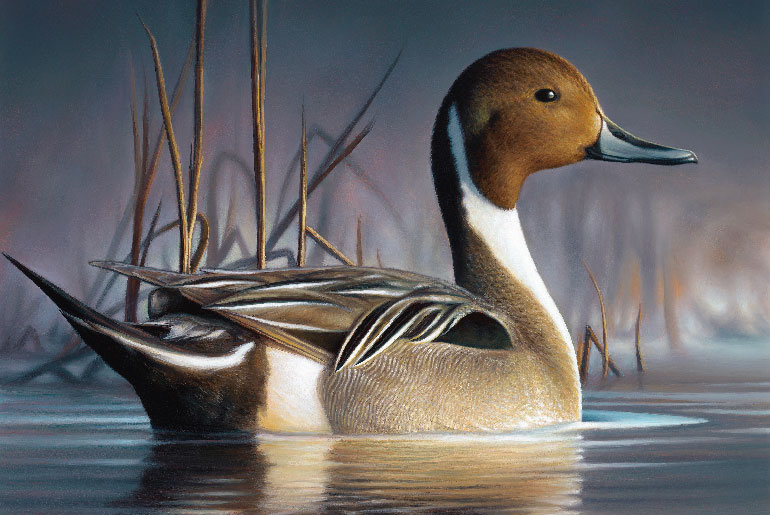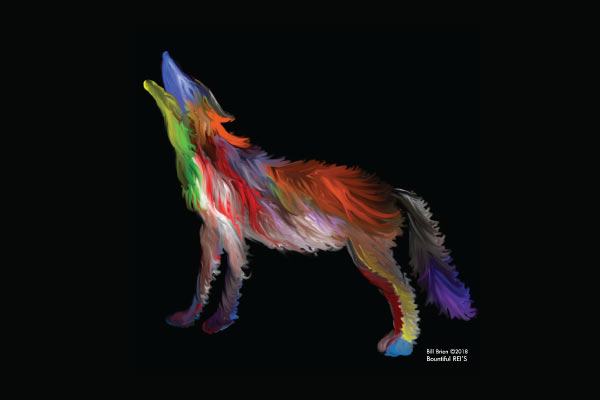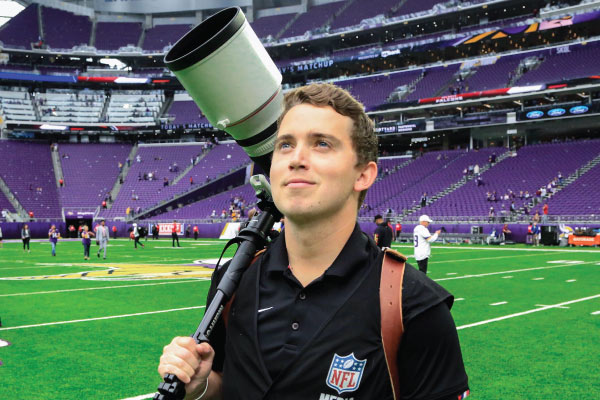Inspired by Nature's Palette
UND alum practices conservation storytelling through his art.
The 10th time was the charm for Montana-based artist Chuck Black, ’10.
Chuck won the 2023 Federal Duck Stamp Art Contest, besting 199 other artists and achieving a lifelong goal. “The duck stamp was something my father showed me when I was a little kid. I was always enamored with it,” he said.
The victory came after Chuck entered 10 federal and numerous state contests. He won the top prize in the 2013 Colorado Waterfowl Stamp Competition and the 2015 California Duck Stamp Competition.
“I’m very much at a crossroads. The stamp and winning the contest had been a long-term goal. I feel validated. I have arrived at a point where I can take what I’ve learned and apply it to something meaningful.”
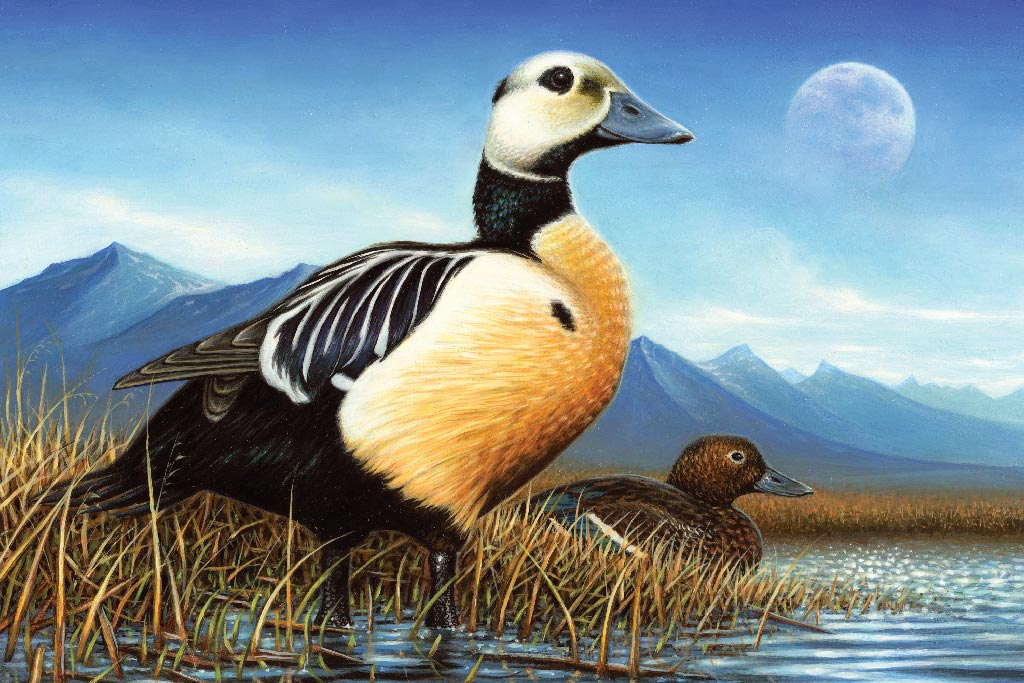
Chuck's 2016 Federal Duck Stamp entry.
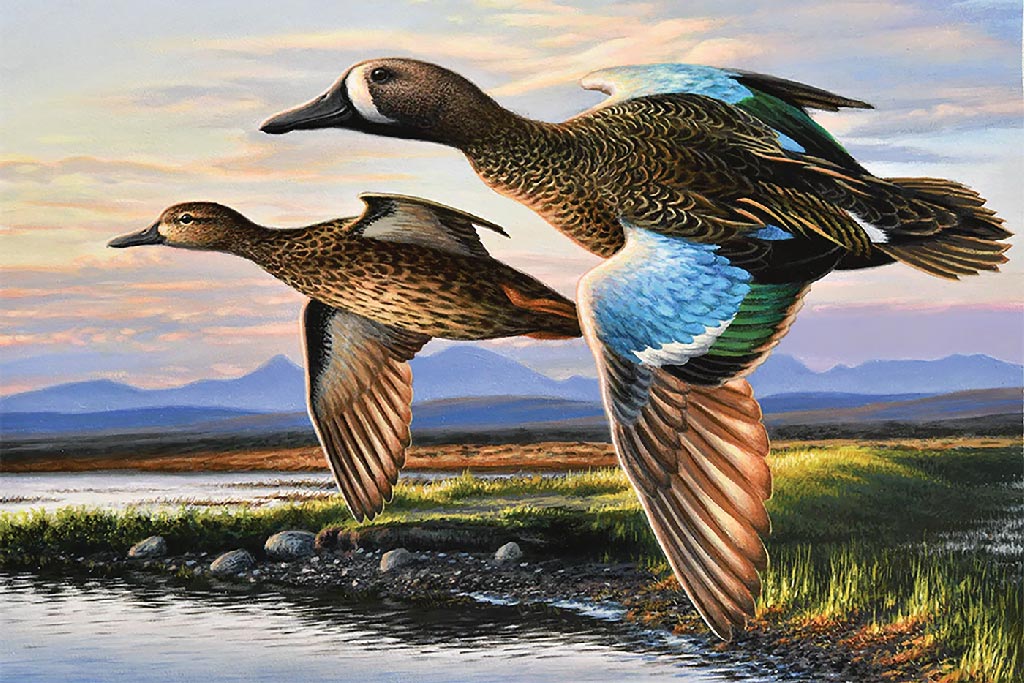
Chuck's 2017 Federal Duck Stamp entry.
Chuck’s Journey Begins
Chuck’s passion for creating art started in his youth. Sitting for hours in a classroom was a challenge, and he often daydreamed about the outdoors, where he spent most of his free time exploring with family and friends. Drawing outdoor scenes became his escape. “I put my mind back there, where I wanted to be,” Chuck said.
He began selling artwork on eBay in high school and entered UND as a wildlife biology major. While a student, he did custom art. Chuck briefly switched his major to art but realized that it wasn’t the artwork he was passionate about; it was his subject matter – the outdoors.
After graduating, Chuck worked at Theodore Roosevelt National Park, conducted sage grouse research in Montana, tracked mule deer with Colorado Parks and Wildlife, and managed wild hog populations at Great Smoky Mountains National Park in North Carolina and Tennessee.
His work with wildlife in those jobs enhanced his artistic perspective. “A lot of that work was very hands-on with big game animals, giving me a different perspective on their behavior.
“When you see an animal standing up on a hill and they’re looking back at you, it’s a cool moment. Then the animal ducks into the trees and that’s kind of the end. But if that animal is tagged with a radio collar, you have all the knowledge of where they’ve been and what they’ve been up to. It’s almost like you get to join them in their journey.”
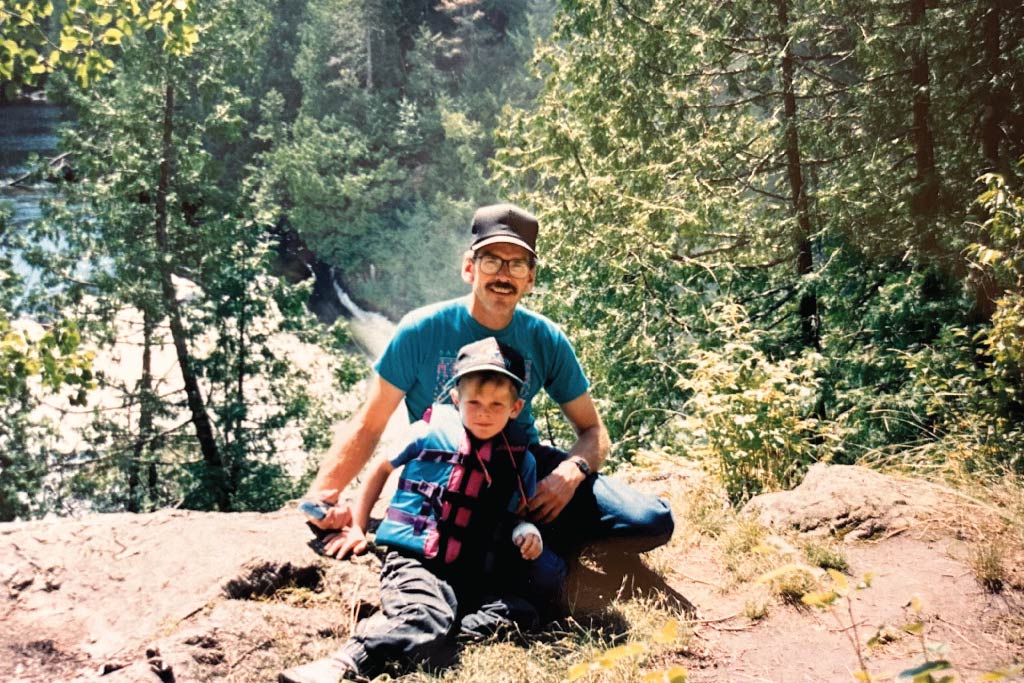
From an early age, Chuck Black, from Stillwater, Minn., explored the outdoors with his family, including his dad, Dennis.
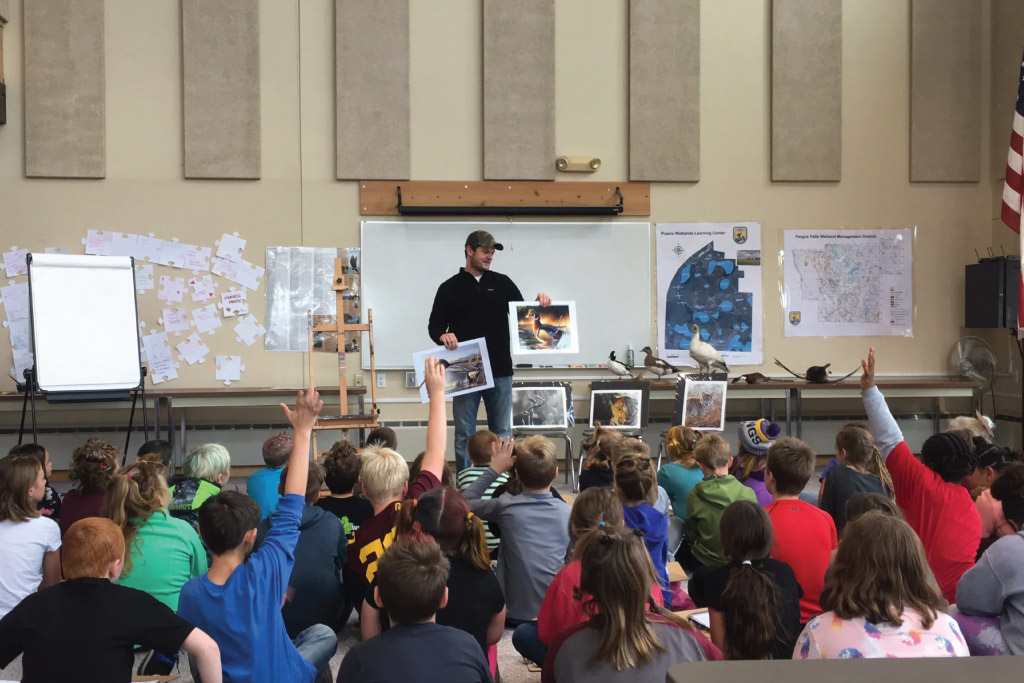
Chuck encourages children to pursue art by sharing his story and his pictures.
The Turning Point
During his last year working outdoors, Chuck was a bat technician at Smoky Mountain National Park. His job was to sit near a cave and watch for bats to emerge.
After a couple of weeks seeing no bats, Chuck asked his supervisor if he could work on art and spent hours painting his natural surroundings. “Sitting in the woods for four or five hours a day just looking at the cave, I started to think differently about my relationship with artwork and the outdoors. I started to think about capturing moments in time.”
Chuck’s intuition told him he needed to pursue art. “That was the turning point for me.”
He quit his job in 2015 and moved to Montana to pursue art full-time.
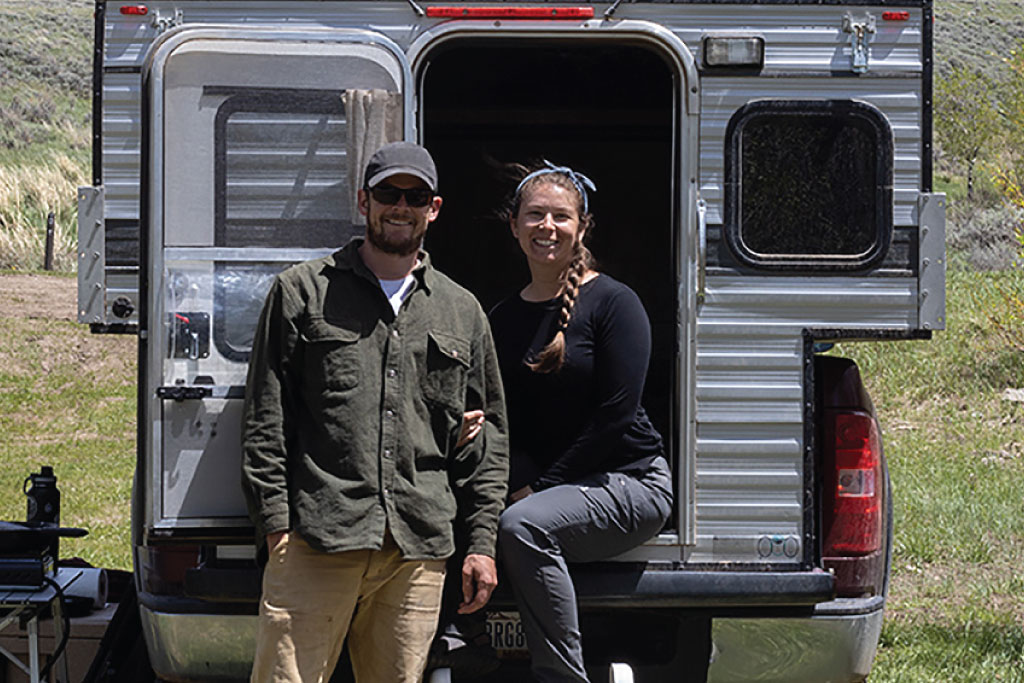
In 2020, Chuck and his wife, Erica, watched, photographed, and took video of the Northern Pintail for hours, knowing it would soon be eligible for the duck stamp contest. In 2023, his painting won the Federal Duck Stamp Contest.
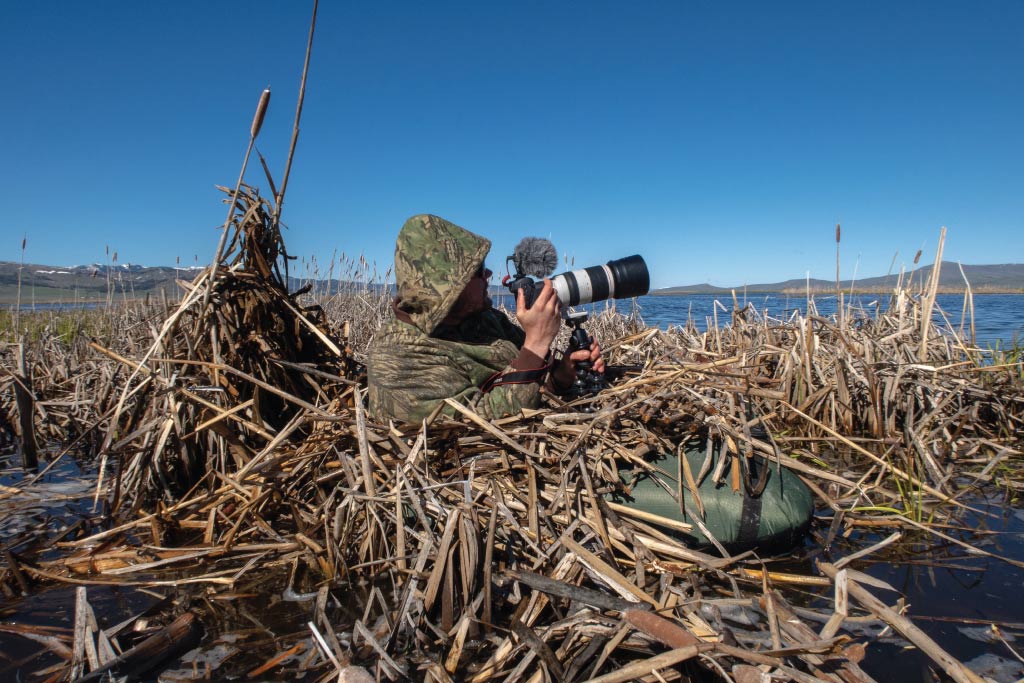
Chuck in the marsh, waiting to capture the Northern Pintail.
In Pursuit of Perfection
Chuck experimented with acrylics and oils, studied the orientation of others’ artwork, and applied the golden ratio to his art. “Learning new things is always my interest. It’s not necessarily producing one result,” Chuck said.
When the world shut down in 2020, Chuck bought a truck camper and a wall tent. “I gave myself permission to loosen up in my painting.”
He spent many hours watching the Northern Pintail, the duck species featured in his 2023 contest entry, which paid off when he won the duck stamp contest. “I’m still trying to believe it today,” he said.
All U.S. waterfowl hunters are required to purchase the Federal Duck Stamp for $25 every year they hunt. The program raises about $40 million annually to protect wetland habitats.
Winning the competition means more eyes are on Chuck’s art. “People are going to learn about me as an artist. That’s why I’m thinking so deeply. I want to be consistent in what I deliver.”
Listen to your own perspective because that’s where your identity lies.
Conservation Storytelling
“All I talk about with my wife is where I want to go next and what subject matter means the most to me,” Chuck said. “I want to focus less on the technical process and challenge myself to find the subjects I want to put myself into. I want to tell stories that matter to me.
“I hope to create something that connects us, brings us together, and maybe inspires
people who weren’t that attentive to the outdoors or conservation to become so.”
Storytelling is about much more than natural resource conservation, Chuck said. “It
can be religious or community conservation. To me, anything that’s important to you
is what conservation storytelling represents.”
Conserving our story is the backbone of our beliefs, values, and discoveries, Chuck continued. He advises young artists to follow that philosophy: “Listen to your own perspective because that’s where your identity lies. If you don’t have that, you lose what makes you and your work unique.”

